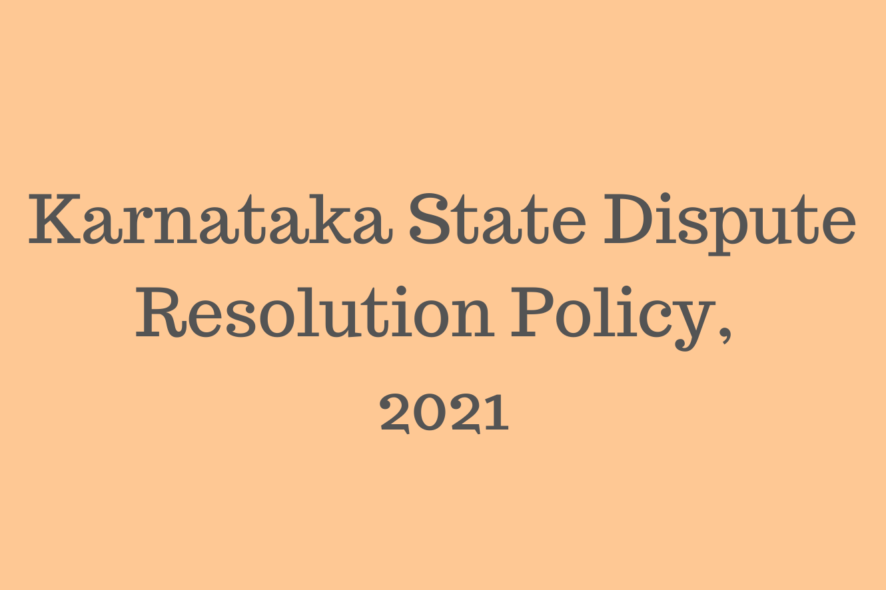The Karnataka Government has passed Karnataka State Dispute Resolution Policy[1], 2020 to combat the rise in pendency of cases in the State of Karnataka. The litigation in the State have increased specifically where State Governments are party to lakhs of litigation in the High Courts and Subordinate courts of Karnataka.
The Policy aims at speedy disposal of cases including the adoption of Alternative Dispute Resolution (ADR). The present Policy 2020 has been formulated in supersession of the Karnataka State Litigation Policy, 2011.
Goals and Objectives
The goal of the policy is “to instill Responsibility, Accountability and Efficiency in the State’s approach to conduct of disputes”[2]. The objective of the policy are “Prevention, Management and Resolution of disputes”[3]. The Policy states that in its implementation, the Stakeholders have to to be guided by the values of fairness and non-arbitrariness, integrity and fearlessness, sincerity, timeliness and responsiveness, transparency, resolve, consistency, discipline.
The 55-page dispute resolution policy recommends that each department should appoint a nodal officer to coordinate with the law officers and assist the heads of the departments on legal matters. The nodal officer should be an advocate with legal practice experience of at least five years.
The policy has envisaged the establishment of a dispute resolution board in each department. It recommends the constitution of an empowered committee headed by the Chief Secretary to monitor the implementation of the policy and evaluate the performance of stakeholders internally.
Policy Structure[4]
Each chapter in this Policy aims at taking implementable measures that address prevailing problems in managing government disputes.
- Chapter 2 describes the various Stakeholders involved in government disputes and their role in conducting or administering government disputes.
- Chapter 3 points that lack of systematic performance evaluation by Stakeholders as a major reason why the government dispute system is unable to identify problems and devise long-lasting solutions. This chapter emphasizes the importance of establishing performance indicators and evaluating performance based on key operation metrics and budgeting considerations. Further it provides for the establishment of an Empowered Committee to monitor the implementation of this Policy and undertake performance evaluation at a systemic level.
- Chapter 4 highlights the importance of data management for efficient running of a government dispute system. This chapter lays out the essential components of a data management system and strategy to be evolved by each Stakeholder Representative.
- Chapter 5 mandates and encourages the use of technology for data and workflow management. This chapter provides for the establishment of Karnataka Government Dispute Management IT Cell” (“IT Cell”) to create technological infrastructure, in consultation with stakeholders, for managing government disputes.
- Chapter 6 recommends reforms for improving conduct of government disputes. It also directs employment of risk management systems and strategies to prioritize cases and assist work allocation. Further, to assure quality of representation, it is recommended that appointment of Law Officers conforms to the standard set by the Supreme Court.
- Chapter 8 mandates the use of Alternative Dispute Resolution (ADR) by the government in dispute prevention and dispute resolution. It directs the establishment of Dispute Resolution Boards in each department to authorize representation of Law Officers and approve settlement terms. The Chapter also provides for the formation of a Working Group led by the Advocate General, to assist each State Department in formulating an ADR strategy to identify suitable disputes for ADR and participate in it effectively.
- Finally, Chapter 9 collates the implementable measures laid down by this Policy and wide publication and extensive awareness generation of this Policy amongst Stakeholders.
*Tanvi Singh, Editorial Assistant has put this story together.
[1] https://erajyapatra.karnataka.gov.in/WriteReadData/2021/1931.pdf
[2] Para 7 of the Karnataka State Dispute Resolution Policy, 2021
[3] Para 8 of the Karnataka State Dispute Resolution Policy, 2021
[4] Para 9.2 of the Karnataka State Dispute Resolution Policy, 2021






